Leadership from Below
Caitlin Logan on the flourishing of mutual aid groups across Scotland and the potential for sustaining and nurturing these groups beyond the immediate crisis.
“What we are experiencing is giving us a greater sense of community than we’ve ever had. Communities in Scotland are coming together, people are seeing that they are able to help their neighbours. I would be utterly sad if it went away – and I don’t think it will,” says Laura Kane, who helped set up the Glasgow Southside Self-Isolation Support group this March.
Kane is one of many people around the country who have volunteered their time and skills in their local area to help people who are struggling during the COVID-19 pandemic. For her, working as a marketing manager in the private sector, this has been a new experience and a hopeful sign of what’s to come. If more people like her can maintain the momentum throughout and beyond this crisis, it might be that the mutually supportive relationships emerging within communities can become a part of the “new normal”.
For others, the virus and its imposed social distancing has thrown a spanner into the works of ongoing efforts to forge connections and reduce the isolation and alienation that already posed a risk to some of Scotland’s most overlooked people and places.
Yet through the chaos there is a shared sense of resolve, if not optimism, that this must act as a wake-up call, that lessons can be learned, and that the potential exists within every community to find new and better ways of working – and living – together.
I spoke to just a few of the mutual aid and community support projects that have flourished in recent weeks to learn more about how they are adapting to the crisis and what their experience has taught them about the kind of future that might be possible after the dust settles.
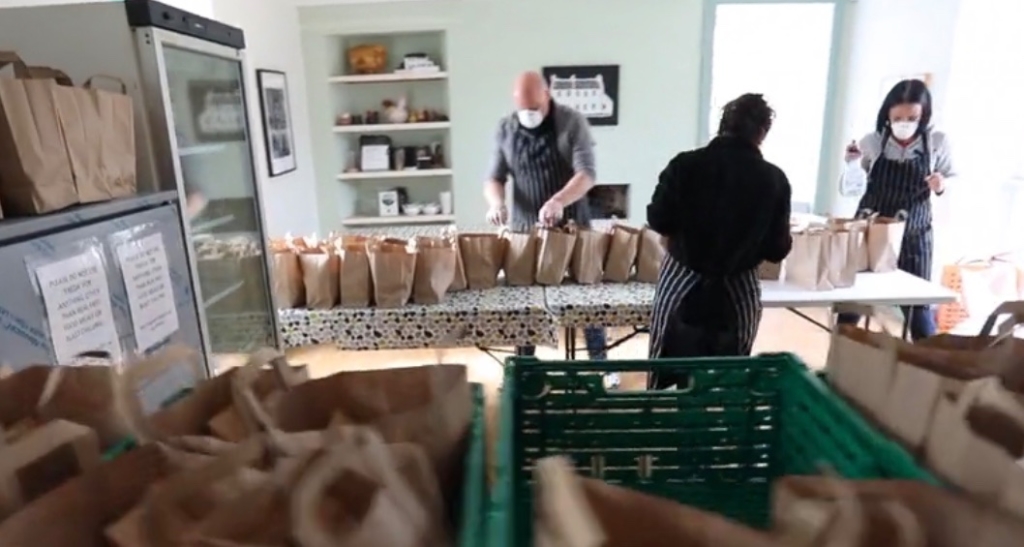

Edinburgh
Bridgend Farmhouse
Bridgend Farmhouse in South Edinburgh is among countless community organisations which have had to think fast and find innovative ways of offering help after their services were rendered impossible to deliver under social distancing guidelines.
In normal times, the farmhouse operates as a community hub for learning, eating and exercise. “It gives people somewhere to go who are socially isolated and it’s an important part of their routine,” interim manager Lynn Houmdi explains. “It was really difficult to have to shut our doors to those people.”
But the team behind Bridgend Farmhouse quickly began planning a new approach, which would centre around meeting an urgent need for food – both among people who had been in food poverty before the crisis, and those who were pushed into poverty or isolation as a result of it. “We were approached by a local chef who was well connected with other chefs, and we recruited a team of volunteer chefs and a packaging and distribution team of catering managers, many of whom have recently lost their jobs.”
This forms part of a partnership with chef Lewis McLachlan’s Empty Kitchen, Full Hearts programme which is working across the city in response to the crisis. There is high demand for the initiative and 80% of the farmhouse’s deliveries have been organised through local community organisations who know the people in their areas and are able to get the food to those in need.
“In the first two weeks we delivered 100 food parcels per day and we are now working towards 300 parcels per day. We just passed 10,000 meals in the first month,” Houmdi says.
Bridgend Farmhouse is already planning the next stage of its response. “We’re going to be delivering services we normally did online, such as open drop-in sessions; we’re looking into ways of providing laptops to people who would be excluded from accessing things like Zoom; and we are working on ways to make bikes available for key workers.”
Beyond this, the organisation is mindful that the present crisis will “worsen a lot of other issues for people in the community” and that it’s essential to start planning now for how to transition from lockdown and find ways to reduce social isolation. This is something Houmdi hopes will be aided by new relationships which are being formed with community groups and people. “While this is a crisis response, a lot of this will have long term benefits and partnership working is a big part of that.”
Houmdi says she is encouraged by the “incredible” support that has been offered by volunteers and from companies in the form of in-kind donations. “I would hate to think that would dissipate after this.”
She adds: “If you think it will it’s going to be hard to get through this time. Our society wasn’t fair, and people were denied things they needed. If we go back to the way things were, then all of this, all these deaths, will have been for nothing.”
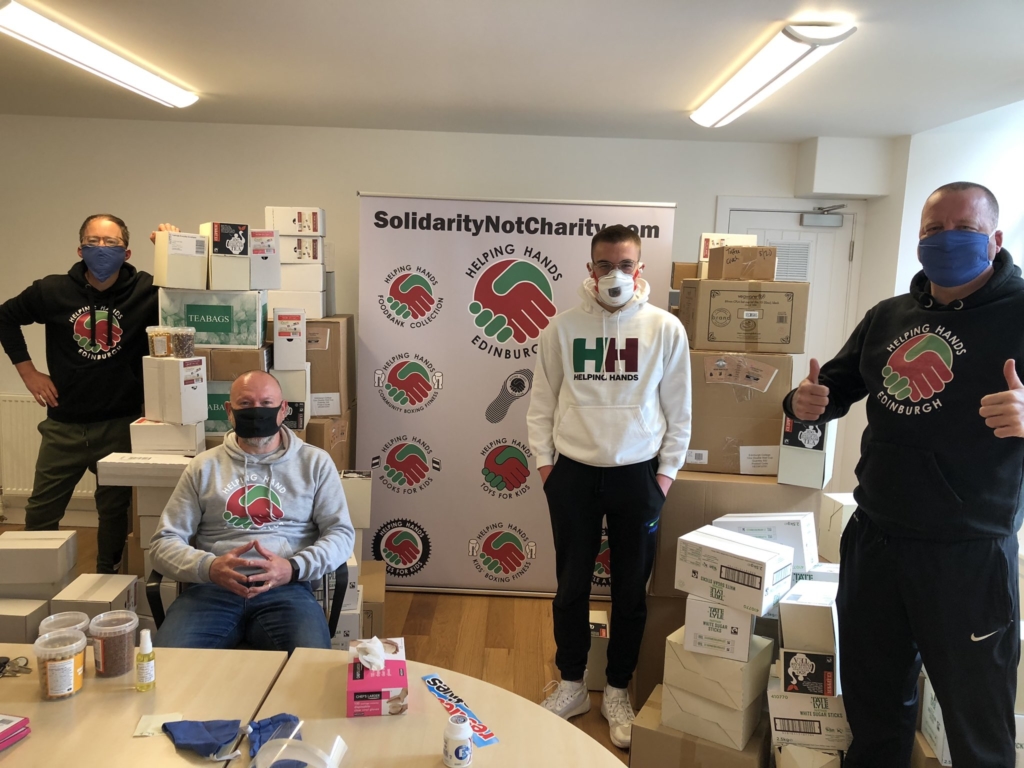

Helping Hands Edinburgh
Working across some of Edinburgh’s poorest areas, the entirely volunteer-run Helping Hands was set up five years ago to offer free sport activities and other help for communities, such as a Christmas foodbank collection. “Solidarity not charity” is its motto, based in the belief that people who live and work in working-class areas are best equipped to work together to support their communities.
In response to the pandemic, Helping Hands volunteers have diverted their attention from their football programme, currently on hold, to deliver 1000s of food parcels per week to those in need.
“But we are so much more than that,” co-founder Jim Slaven says. “By the summer we will have provided 600 new bikes to working-class kids, and we are offering online keep fit classes and mental health videos, delivered by qualified experts who are giving up their time.”
A long-time critic of government- and charity-led responses to inequality and deprivation, Slaven says that this crisis has “provided a moment of clarity” for many people about a glaring absence of support. This is what Helping Hands aims to counter by taking a different approach.
“The fact that working-class communities have been abandoned by the state meant we felt it was important to offer solidarity,” he explains. “This hasn’t just happened with COVID-19 – for thirty or forty years the state footprint in working class communities has become smaller and smaller.”
The voluntary, or “third” sector, he believes, has become little more than a “poverty industry”. By relying on state funding, Slaven says the voluntary sector has become “something of a shadow state”, working for the government’s agenda. “This is why Helping Hands Edinburgh will never take funding from the state.”
Instead, Helping Hands is supported entirely by community fundraising – for example, a young woman from the local area has agreed to run 5k every day in May to raise money for the group’s work – and all this money goes back into the communities where Helping Hands.
While Slaven feels that people are “thankful for the help they are getting”, he says they are also “furious about the fact that the state and voluntary sector aren’t there”.
This moment, he says, could mark a shift in how working-class communities organise themselves when the crisis abates. “People are realising that if we are on our own, we need to get organised and we need to offer mutual support and solidarity in our communities.”
Follow them at: @EdiHelpingHands
More here: https://solidaritynotcharity.com/
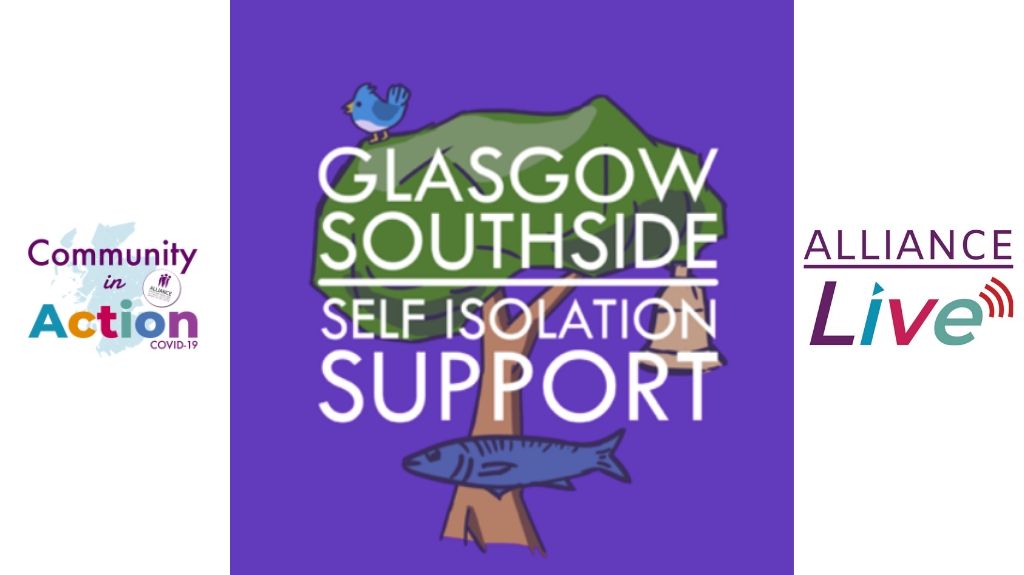

Glasgow Southside
Glasgow Southside Self-Isolation Support
Glasgow Southside Self-Isolation Support was conceived in direct response to the crisis. On 12 March Rhona Sweeting, who works as a project manager in renewables, posted on the Battlefield Community Project Facebook page suggesting that help could be offered to people who were stuck in their homes. Within 24 hours, over 100 people had signed up and the group grew to cover the whole of the Southside.
“People had a sense that they wanted to do something and didn’t know what to do,” says Laura Kane, one of four people involved in running the group. “Community groups didn’t want to be overrun for requests about coronavirus, so we stepped in to give that support.”
The group has focused its efforts on developing a peer-to-peer support network, helping people to access existing resources and other organisations, and recruiting ‘Street Champions’ to volunteer to help their immediate neighbours. “Over 1000 people have now signed up to volunteer. We’ve fulfilled over 150 requests so far and we are developing long-term relationships. We’re setting up phone-trees and we have lots of streets covered but we still need more volunteers.”
None of the group’s organisers ordinarily works in the voluntary sector, and Kane feels that they have managed to be “quicker off the mark than the third sector”. “They’re still gearing up to deal with this, so it has been down to community groups like ours.”
“That has been sad to see, because the people behind these organisations are some of the smartest people I’ve ever encountered, but they have a lot of red tape to go through that we don’t, and the challenges they have are extraordinary,” she says.
A positive to come from this situation, in her view, is that it has allowed people who “rarely get the opportunity” to actively help their communities to step forward. “A nice thing is that people are excited to help. We haven’t seen people come together like this for a long time.”
As far as the future goes, Southside Self-Isolation Support Group hopes that it will be able to carry on its work even after social distancing ends. “People are realising that there are a lot of people who need a bit of help, and it’s really easy to do.”
More details here: https://www.southsidesis.co.uk/
Levenmouth, Fife
Coronavirus Levenmouth Support
Levenmouth is an area with high levels of deprivation, so the need for support in the face of the pandemic is considerable. It is also an area which Buckhaven councillor Ryan Smart believes had the “upper hand at the start of this”, because of a strong tendency to “look after our own community.”
Smart set up the Coronavirus Levenmouth Support group on Facebook, which attracted thousands of local people within 24 hours. “All these people had wanted to do something to help and we wanted to give an outlet for them.”
The group was established as part of a coordinated response in the Levenmouth area, agreed by local charities, community groups, churches, and community councils. “The difference between Levenmouth and the overall Fife response is that this was put in place and led by local people, not the council,” Smart says.
The local partnership also produced a leaflet which went to every house in the area listing the contact details for community organisations, churches, community councils, councillors and national helplines.
While other organisations such as Fife Voluntary Action and Gingerbread are providing direct support, Cornavirus Levenmouth Support aims to facilitate information-sharing and support among community members in an isolating time. “A key thing for us was to make people aware that there is still community support for them. A lot of people have posted videos of them singing or bairns doing dances. Bairns have been drawing pictures for older people.”
He hopes that this crisis can lead to a stronger sense of community in future, and reflects that he has noticed lots of little examples of people “stepping up and not just thinking about me, myself and I”.
“We’ve got to think about the world post COVID-19. Things have changed and certain things won’t go back to where they were before. People know there’s going to be significant changes – the question is whether the good changes can continue.”
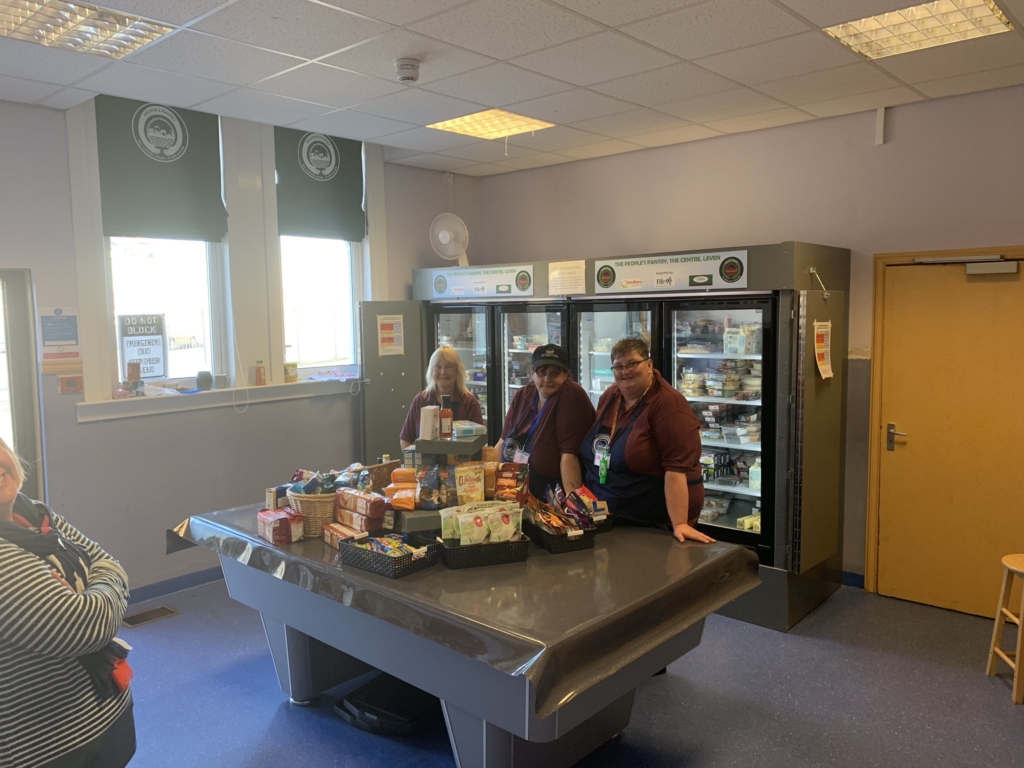

People’s Pantry Leven
One of the people leading on the crisis response in Levenmouth is Billy Bain of the People’s Pantry Leven. Established a little over a year ago, the People’s Pantry is a form of food co-op for people who are socially isolated or struggling for food. The Pantry’s 155 members would normally pay £2 a week and use their “points” to shop from the pantry’s stock, saving the average member £20-30 per week.
“In normal circumstances a person would come along, get a cup of tea and cake and chat and then go and do their shopping,” Bain explains. Now, the café is closed, and the People’s Pantry is operating with social distancing measures in place. “This is a strange way of doing things for us, because we’re all about encouraging people to chat.”
While the Pantry has lost some of its ability to tackle social isolation, it has turned its attention to reaching more people with its food provision. “We realised quickly we couldn’t continue with only our members in the current circumstances, so we have opened up to people who aren’t members but are joining us on a temporary basis.”
In addition to this, the organisation has consolidated its efforts with the foodbank and Fife Voluntary Action to organise food deliveries to over 200 families in the area so far. The food provided comes from the national charity Fareshare and from Fife Council’s food supplies, while volunteer delivery drivers come from the council local charity Brag Enterprise.
Bain says that other community groups and businesses have also been keen to get involved in helping out. “Lily’s Larder in Lundin Links is sending us ready meals, and we’ve given some food which we couldn’t use to Leven Rotary Club which they’ve been cooking with. One of the Rotary Club members owns Agenda [a bar/restaurant in the area] and has been using the kitchen to get food out to communities and they’ve been making ready meals for us.”
In fact, he says that more people have been asking to volunteer than can be accommodated – something he hopes could be a positive sign for the months and years ahead. “It’s strange considering the social distancing aspect but I think this will bring more people together. I don’t think there will be ‘normal again’, but a new normal, and I hope we are left with communities that are more connected.”
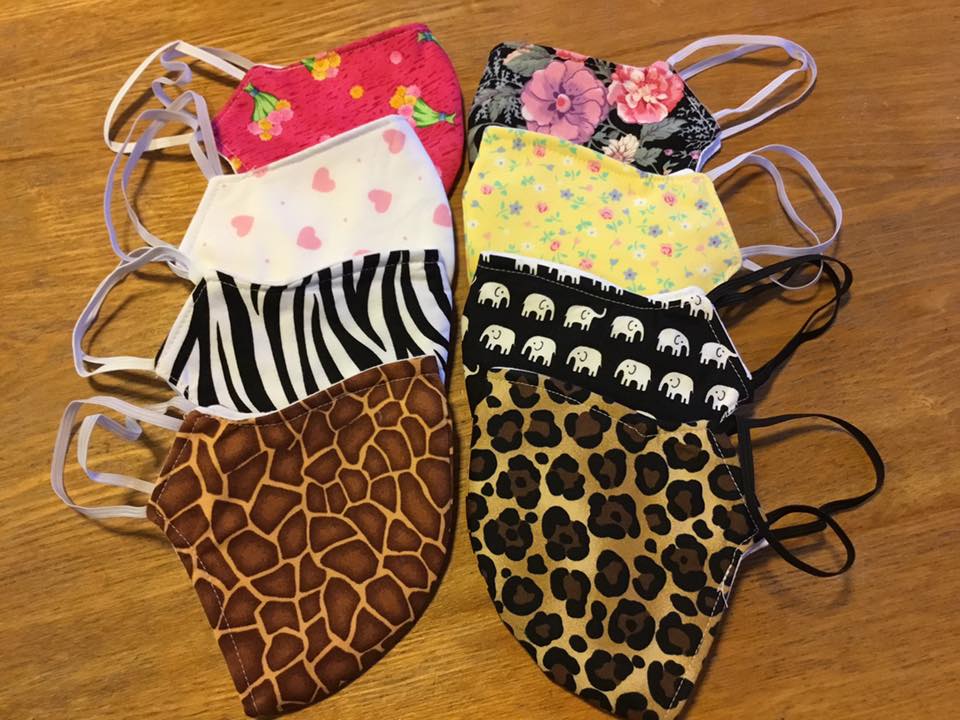

Handmade masks by Marina Nicolson
Shetland
Support for Self-Isolation Shetland
While there are challenges to facing this crisis in a remote area like Shetland, community council chair for Gulberwick, Quarff and Cunningsburgh Amy Garrick-Wright feels that that it enjoys a unique community spirit which has aided in the response. “Shetland has a strong sense of community and there’s a lot of community support. I don’t think Shetlanders are people who like to sit at home – it’s different from other places.”
Garrick-Wright, who is an electrician by day, was inspired to set up the Support for Self-Isolation Shetland Facebook group after seeing its counterpart in Glasgow Southside. “I thought it might give people a sense of community, connection and somewhere to go,” she says.
“I knew this was going to make people who are isolated more isolated, and that people who are struggling would struggle more. I didn’t want people struggling and wondering if people would want to help.”
The group differs somewhat from the one in Glasgow in that it has centred around creating an online community and a place to share information and queries, rather than recruiting volunteers, which was already being organised locally by the Red Cross.
Garrick-Wright identified five other people to help run the support group, which now has over 5000 members. The group has been included in a forum with adult social work, Red Cross, the foodbank, NHS and others, enabling them to pass on information to community members, and on another page moderated by the group, Hame-Aboot Taegither, people are able to share arts and entertainment themed posts to help support people’s wellbeing.
Garrick-Wright is optimistic that this time of crisis might lead to some positive outcomes for the community. “I have a hope that this encourages people even beyond this to help their communities, as they are being empowered to do that by this situation. I’m 35 and I’ve been trying to get people my age and younger involved in the community council but it’s really hard. They don’t have a lot of power, so it doesn’t necessarily attract the kinds of people who are interested in power.”
“It’s great to see this as a way to get people involved. This might get people thinking different about what they can do for their communities.”
More at: https://www.mutual-aid.co.uk/group/support-for-self-isolation-shetland-coronavirus
….
Over the past two months, as the scale of the challenges to come have become apparent, every corner of the country has seen local people rise to occasion by providing an emergency response through community food initiatives and support for coping with social isolation. In the process, many people have become more acutely aware of the untapped strength of communities and of the wider injustices which had left so many people on the brink of crisis in the first place.
What the future holds is likely to be different across the varied and disparate communities of Scotland. One thing is certain, there is no “back” to normal: there is only forward, and if the mutual aid efforts that so many communities have now begun can be sustained, that might just be a good thing.

Ferguslie Support Group
Carloway Community Association
Partick Thistle Community Trust
Charing Cross
This is so good to see.
I agree with the wariness of one organiser about getting involved with the “poverty industry”. The large national charities are a kind of market privitisation of the caring sector. They operate like businesses and break the social contract between state and citizen in need, allowing national and local govt. to out-source their responsibilities.
They also interfere with authentic neighbourhood networks, acting as a break on real grass-roots activism, insisting on the impratur of themselves or the local authority before any local activity is sanctioned.
They may be “not for profit” (“we spend all we get”) but the top brass get nice pay, nice offices and global travel to various junkets several times per year, all fully funded by us taxpayers. The high street charity shop is just an branding/marketing exercise. They are usually staffed by committed and well meaning people at the front-line however.